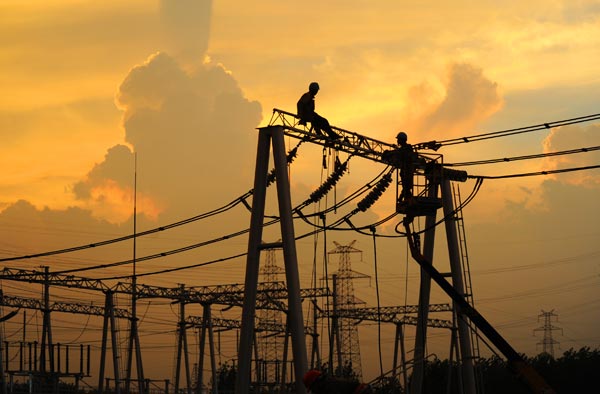|
 |
|
Workers check transmission equipment at a transformer station in Xuzhou, Jiangsu province, Aug 9, 2013. [Photo/Asianewsphoto] |
BEIJING - Xuzhou, an east China metropolis with a population of more than 9.7 million, was once known as the "coal city." Following an economic transformation, however, Xuzhou has become a "garden city" with a greener economic base.
With China set to slash steel and cement capacity and eliminate tens of thousands of coal-fired furnaces, according to a work report delivered by Premier Li Keqiang at the ongoing legislative session, other cities will have to follow in Xuzhou's path of economic reinvention.
Economic transition
Located in the north of Jiangsu province, Xuzhou saw the dawn of its coal mining industry as early as one century ago. However, the coal mining boom led to a set of environmental challenges, with local forest coverage declining to only 1 percent before the People's Republic of China was founded in 1949.
Xuzhou began to face economic troubles in the 1990s due to gradual depletion of coal resources. The city had to shift its economic base to a range of non-coal industries to hire workers formerly employed in coal mining companies, and the city has managed to make a Pittsburgh-style economic transformation.
Xuzhou Coal Mining Group Corporation (XMC), the local coal mining titan, survived the industry downturn and has thrived in recent years by diversifying its business scope.
XMC had to close more than 60 percent of its coal mines in 2001 because coal resources had been exhausted. At the time, coal mine workers couldn't even make 10,000 yuan ($1,630) per year.
Today, business revenue from non-coal sectors, including real estate, logistics, coal mining equipment, and healthcare, accounts for the lion's share of the company's total revenue, and workers are able to make more than 61,000 yuan on average per year.
Agricultural product processing, logistics, tourism and construction machinery have emerged as new pillars of the local economy, and the gross domestic product (GDP) of Xuzhou rose by 12 percent in 2013 from the previous year to about 450 billion yuan. The growth rate significantly outpaced the nation's average of 7.7 percent.
 |
 |
